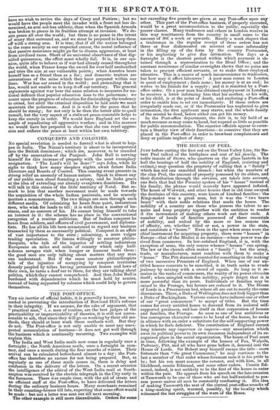CONQUESTS AND COLONIES.
No special revelation is needed to foretell what is about to hap- pen in India. The Nizam's territory is about to be incorporated into the British dominions ; which are, moreover, to be rounded off by the annexation of the Punjaub. John Bull is nerving himself for this increase of property with the most exemplary resignation. "The Lord's will be done! " says John, while he sighs to think how many sleepless nights await future India Directors and Boards of Control. This coming event presents in strong relief an anomaly of human nature. Speak to almost any of our public men about founding a colony, and he looks grave at the idea of extending our already overgrown dominions. He will talk in this strain of the little territory of Natal. But re- mark to him that another movement must be made towards the acquisition of the whole Indian peninsula, and he scarcely mutters a remonstrance. The two things are seen through such different media. Of colonizing he hears from quiet, industrious men, who wish for lands to till : it is with them a matter of bu- siness, and no concern of his. He cannot bring himself to take an interest in it : the scheme has no place in the conventional categories of a routine politician. But of Indian conquest he hears from soldiers, and officers of civil government, and diploma- tists. He has all his life been accustomed to regard any business transacted by them as necessarily political. Conquest is an affair of vast importance to the state ; colonizing, a mere vulgar trading speculation. He listens willingly to amateur philan- thropists, who talk of the injustice of settling industrious Europeans on miles and miles of country which only half- a-dozen savages visit when hunger or humour leads them : the good men are only talking about matters that any man can understand. But if the same amateur philanthropists talk of the injustice of occupying by conquest territories densely peopled by tribes having permanent homes and laws of their own, he turns a deaf ear to them, for they are talking about politics, which they cannot comprehend. And thus John Bulbs burdened with dependencies which he must hold by armies, instead of being supported by colonies which could help to govern themselves.


























 Previous page
Previous page